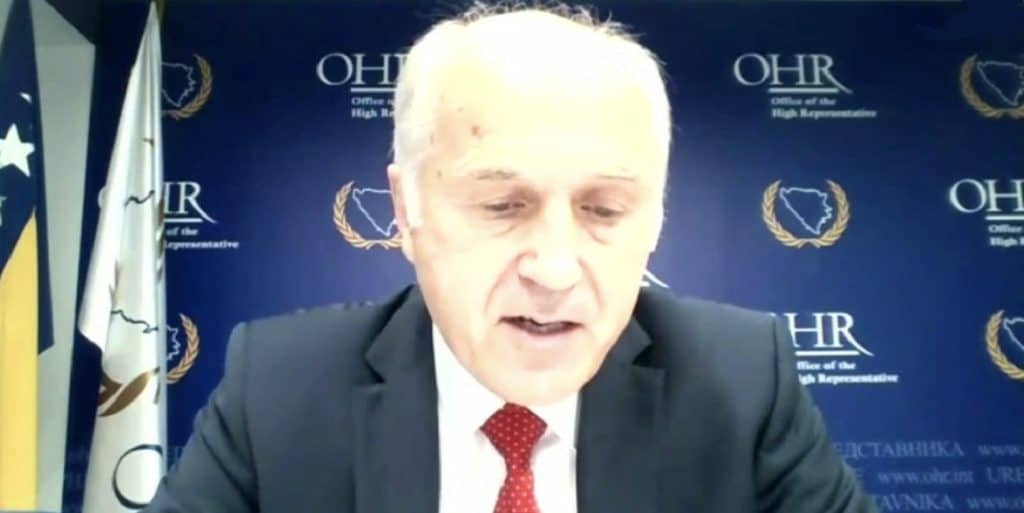By Slaviša Milačić
Bosnian High Representative Valentin Inzko, charged with overseeing the civil implementation of the 1995 Dayton Peace Agreement that ended the war in Bosnia, presented his 58th report on the situation in the country on 5 November 2020 to the United Nations Security Council.

He again accused Bosnian Serb and Croat leadership of secession, disruptive actions and attempts to make Bosnia appear dysfunctional.
“Republic of Srpska authorities are undermining Bosnia`s institutions and threatening its sovereignty, attacking the High Representative and foreign judges, and refusing to accept migrants. The Serbian member of the Presidency, Milorad Dodik, is the loudest in disputing Bosnia and Herzegovina, which he calls an impossible state“ – Inzko told the representatives of the states of the UN Security Council.
Such selective attacks on Serbs could not remain without a diplomatic response. Russia’s Permanent Representative to the UN Security Council, Vasily Nebenzya stated:
– We have listened carefully to Mr. Inzko and we are sorry that the quality of the High Representative’s report has not been improved. Criticism of Serbs in Bosnia has become a standard way of writing the Report. Instead of accusations, the OHR should offer solutions. The people of Bosnia and Herzegovina deserve to create solutions themselves – Nebenzya emphasized at the United Nations.(1) Nebenzya also called for a revision of the conditions and criteria for closing the office of Bosnia’s international administrator.The Russian position on this issue is well known and logical.
Because what should an international administrator or a High Representative do in a democratic country in the 20th century?! What kind of country is Bosnia and Herzegovina if someone can make decisions outside the Constitution and the law. Unfortunately, this undemocratic practice continues primarily due to the intensified aspirations of certain Bosniak officials to rewrite the Dayton Agreement in favour of the centralization and unitarization of Bosnia and Herzegovina.
The High Representative’s persistent desire to shift all responsibility for the failed process of interethnic reconciliation to Serbs and Croats in Bosnia and Herzegovina is obvious. They are baselessly called Dayton (Peace Agreement) ‘destroyers’. The High Representative wants to scare the international community with the possibility of a dissolution of Bosnia and Herzegovina while completely ignoring the real situation in the country. Its obvious that some “international factors” support these aspirations and that no political views from the Serbian or Croat side can`t be considered.
What is important to point out is that the statements of Bosnia`s High Representative Valentin Inzko are in line with the statements of US ambasador in Bosnia and Herzegovina. Recently US ambassador to Bosnia, Mr. Eric Nelson stated that he advocates “reforms” for both Dayton agreement and the Bosnian constitution.(2) From decades of experience in the Balkans, when a US ambassador in the Balkans starts advocating for “reforms”, it actually represents an announcement of stronger US engagement, ie, as it is now fashionable to say – at least in the US – interference in internal things of that state.
In the 1990s, when United States was the only super power as a Cold War winner, the word “reform” had an almost mythical meaning that could not, and should not, be questioned. It was understood that the system of the so-called liberal democracy, was the ultimate winner of the entire process of human history (which Francis Fukuyama proclaimed urbi et orbi in his world-famous essay “The End of History”, published just a few months before the fall of the Berlin Wall) the only one that can set standards for the rest of the world. Therefore, the word “reform” could mean only one thing – changes in the direction of the ideal, only legitimate and acceptable model for US.
Who was not in favor of “reforms” in the direction of an absolutely victorious and, therefore, the only legitimate order of the so-called liberal democracy – political and economic isolation awaited him. From such a totalitarian and exclusive view of the world, the roots of future “humanitarian” interventions around the world sprouted very quickly.
Donald Trump gained the sympathy of the Serbs because he had promised not to interfere in the internal questions of other countries and because the entire mandate, including the just-concluded elections, he was under attack by the establishment, the deep state and the big media. However, objectively his administration continued to bother Serbia with the recognition of Kosovo and Republic of Srpska with a united Bosnia. He blocked the gas pipelines and the Silk Road to the Serbian protectors, the Russians and the Chinese. However, the change in the US administration towards the Serbs was obvious. During the Trump administration, the facts were taken into account that Serbs and Americans were allies in the two world wars and that certain Serbian interests in the Balkans should be taken into account.
On the other side, Bosniaks are celebrating Biden’s victory as if it were an election in Bosnia and Herzegovina.

The reason is simple, Joe Biden was one of the main lobbyists for the bombing of Serbs in the 1990s. And when NATO started the bombing, Joe Biden celebrated publicly. It was the NATO bombing of Republika Srpska in 1995 that forced Serbs to stay in Bosnia and Herzegovina. Bosniak political leaders now hope that when Biden become president of the United States, he will force Serbs to “compromise“ again.
However, it should be borne in mind that this is no longer a unipolar world in which the United States is the only superpower. And that Trump’s policy is not the cause but an expression of the crisis of American society. That Trumpism will outlive Trump, which means, turning America away from the world towards itself, returning industry from abroad to the country for domestic unemployment and not interfering in the internal affairs of other states. In other words, America can no longer pursue the policies it pursued in the Balkans in the 1990s. However, without a doubt, with the arrival of Biden, the American administration, in accordance with its power, will put additional pressure on the Serbs in favor of Bosniaks and unitary Bosnia and Herzegovina.
Author: Slaviša Milačić – Historian and independent analyst. Montenegro
(The views expressed in this article belong only to the author and do not necessarily reflect the editorial policy or views of World Geostrategic Insights).







